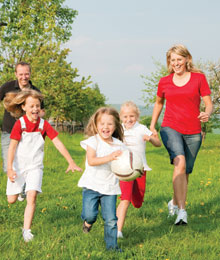Happy We Go!
April 15, 2011 by Simona Panetta
Filed under lifestyle
 While toys and family adventures into the unknown may seem beneficial to those significant years of human development called childhood, experts agree that the only souvenir kids need on their journey to a happy adulthood is time with mom and dad.
While toys and family adventures into the unknown may seem beneficial to those significant years of human development called childhood, experts agree that the only souvenir kids need on their journey to a happy adulthood is time with mom and dad.
“Kids don’t need expensive holidays,” says Linda Cameron, a mother and associate professor in curriculum teaching and learning at Ontario Institute for Studies in Education at the University of Toronto. “It’s quality time, where you are attentive and fully present and mindful of the child – the actual interaction and close one-on-one attention that you pay to an infant – that is far more important than all the toys that you might buy or all the entertainment that you might provide. That gives them a sense of security, connectedness, and an emotional bond.”
The keeping-up-with-the-Joneses society in which we live, however, may have parents struggling with the thought that they are never doing enough. Parents want the best for their children, which can include annual vacations, a bottomless pit of toys and multiple activity enrolments, but sometimes that ‘best’ can mean the worst. “The big mistake that parents make is that they do too much,” says Dr. Edward Hallowell, child psychiatrist and author of The Childhood Roots of Adult Happiness: Five Steps to Help Kids Create and Sustain Lifelong Joy (Ballantine Books). “There’s a great line from Rabbi [Hyman Judah Schachtel] that says, ‘Happiness is not having what you want. It is wanting what you have,’” Hallowell adds.
It can be hard for guilty parents not to overcompensate. A child’s smile when you give them a toy they’ve begged for is priceless, but it will cost them dearly in the end. “There are certain parents, particularly affluent ones, that indulge their children in lots of material things, and those aren’t things that will make them happy. When we place an emphasis on those things, it can lead to feelings of entitlement … feelings that are not ‘happiness’ kind of feelings,” says Christine Carter, happiness expert and sociologist at the University of California at Berkeley’s Greater Good Science Center. As the author of Raising Happiness: 10 Simple Steps for More Joyful Kids and Happier Parents (Ballantine Books) and teacher of the online class Raising Happiness, Carter reveals that the primary ingredients to a happy childhood are expressions of love, compassion and teaching thankfulness.
What matters most to kids is that their parents are present when spending time with them. Having family dinner together, reading at bedtime, picnics and going to a baseball game together are a few simple yet fun activities you can enjoy with your children in order to make them happy little people and, later on, contented adults who know how it feels to be connected, explains Dr. Hallowell. Put simply, a safari in Africa may spark cerebral enlightenment, but leaving your smart phone behind to take a walk in a local park ignites a meaningful bond and a positive impact on the well-being of your child.
A time where emotional, psychological, spiritual and intellectual development begins to form, childhood is that decisive period in one’s life where the building blocks to a happy life are indicative of the level and quality of love, care and attention received from birth and onward. “The key to it all is connection. And really, at its most distilled, that’s love,” says Dr. Hallowell. “Ultimately, as you raise a child in that connected environment of positive energy, invariably the child develops a positive connection to him or herself and to life. The feeling is that ‘I like myself and I like life,’” adds Dr. Hallowell, who recommends questioning those connections instead of your kids’ grades.
That’s because placing a narrow focus on achievements threatens their happiness. Whether it’s forcing excellence in dance, sports or academic success, parents, who often act out of love, don’t realize that these expectations put suffocating pressure on a child, which in turn sacrifices their ability to know what they really need to be happy and successful. “They know what other people want for them, but they don’t know what they want for themselves,” says Carter. ‘Helicopter parents’ (those that hover around their kids to prevent their failures) disengage a child’s opportunity to form the resilience they need in a tough world. This is why it’s important to say ‘no’ when your child asks you to rush in and save them when they forget their homework at home. Learning to step back and allow your child to learn how to face life’s obstacles will only benefit their happiness factor.
Throughout history, philosophers have pegged happiness as the fundamental motivator for human action. Parents can inspire their children by getting to know them and playing with them while blending structure, discipline and supervision. “The best reward a child can receive from his or her parents is parental attention,” says Carter. “The real goal is that the child won’t need a reward from his or her parents, that instead they do it for themselves.”







Comments
Feel free to leave a comment...
and oh, if you want a pic to show with your comment, go get a gravatar!